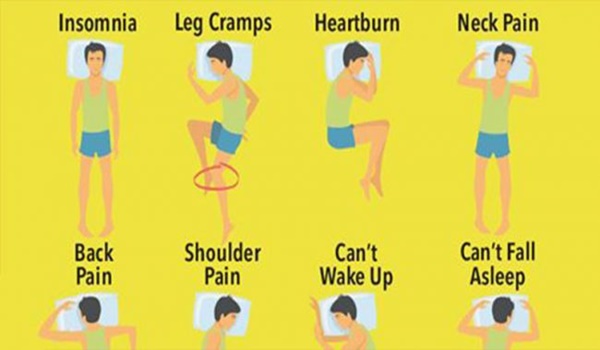Scientists show the way you can treat common health issues by changing the sleeping position.
If you love to sleep, you will be delighted to learn that you can treat and prevent numerous health issues during the time you enjoy your zzz’s. This is the time our body needs to rest and recover, and regain strength for the following day.
Therefore, the quality of sleep we get every night is crucial and can dramatically affect our lives.
Unfortunately, we are living in a sleep-deprived society, and while most of us rarely get the recommended hours of sleep due to stress or too much work, many people out there also suffer from sleep problems.
Yet, scientists claim that no sleep problem cannot be fixed. In most cases, the changes we need to make are simple and easy, like adjusting the sleep position, the pillow, or the temperature in the room.
The position we sleep in can have a huge impact on our health, and here is how to fix some of the most common issues we face as a result of sleeping in the wrong position:
Shoulder Pain

Avoid sleeping on the side if you wake up with pain in the shoulder. Sleep on the back, with a small pillow beneath the painful shoulder. Also, hug a pillow, to keep your shoulder in the correct alignment.
Neck Pain

Your neck pain might be a sign that you need to change the pillow. Replace your pillows at least every two years. Many people claim that latex ones are the most comfortable.
Back Pain

These are the most beneficial positions to sleep in case you experience back pain:
- Back: In case you sleep on the back, place a pillow under the knees, and a small, rolled towel under the small of the back.
- Side: Those who sleep on the side should place a pillow between the legs, and draw their knees up slightly.
- Stomach: If you have back pain and enjoy sleeping on the stomach, put a pillow beneath your pelvis and lower abdomen.
Trouble falling asleep

There are many reasons why you struggle to fall asleep at night, like stress, a heavy last meal, poor sleep conditions, and so on. In this case, make sure you consider these suggestions:
- Establish a pre-bed routine, like reading a book, turning off all the screens in the bedroom, having a cup of soothing tea, etc.
- Don’t consume caffeine in the afternoon
- Exercise in the morning, not in the evening
Inability to stay asleep

Numerous factors can affect your ability to stay asleep, so consider making the following changes:
- Don’t drink alcohol before bedtime
- Make sure the bedroom is not too hot, as the ideal sleeping temperature is between 60 degrees Fahrenheit (15.5 Celsius) and 70 degrees Fahrenheit 21 Celsius).
Inability to wake up

There is a simple solution that will help you in case you just cannot wake up in the morning. Scientists call this “social jetlag”, which is the discrepancy between work and free days, or social and biological time. All you have to do is to set the alarm for the same time every day, even on weekends, so that your body can get used to getting up at that time.
Acid Reflux
To prevent the uncomfortable acid reflux during the night, sleep with the head elevated, or sleep on the left side, to position the stomach below your esophagus.
Snoring

Snoring can be a result of alcohol consumption, medication, smoking, body weight, and nasal congestion. Try to sleep on the side instead of on your back, and use an extra pillow to slightly elevate the torso.
Leg Cramps

Leg cramps during the night can be very unpleasant, and in many cases, they are just a result of stress or dehydration. Therefore, in case you experience them, forcefully stretch your calf muscle, wiggle and massage your leg, or force yourself to walk.
To prevent them in the first place, you should drink plenty of water during the day, and reduce the consumption of alcohol and caffeine. If you sleep on the back, use pillows to keep your toes pointed upward. If you sleep on the stomach, leave them to off the end of the bed.

In case you suffer from sleeping problems, you should initially pinpoint the issue, and then address it, as sleep is vital to our health.


